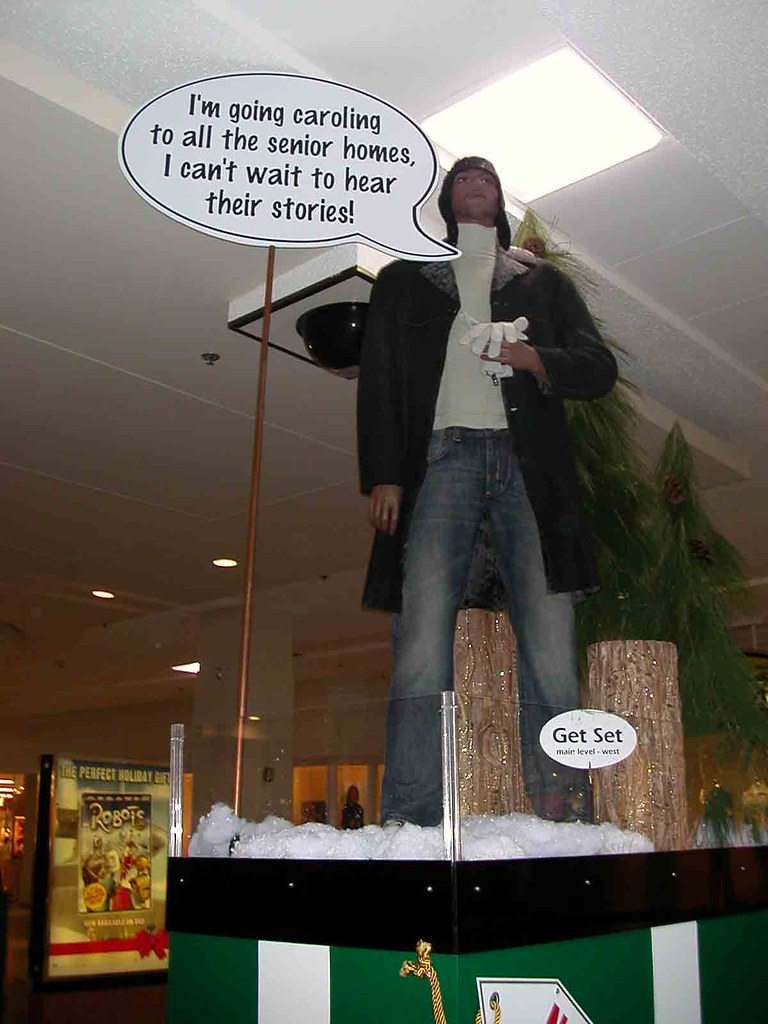As Sardeth alluded, I had a fairly religious upbringing. From my atheist ranting these days, you might suspect that my experience with religion was all horrible and bad, but honestly it wasn't. I don't know whether the church I grew up in changed, and that started my loss of faith, or whether I grew up and started seeing things that were always there, and
that started my loss of faith.
My earliest memories of church are tied to what I believe religion can be at its best. I went to a Mennonite Brethren church, and when I was young this was a passionate, activist, thinking kind of church. We sang songs about being called to service, and then we went out and did service. We sponsored refugees, taught English to newcomers, scrounged furniture and clothes for families in need, and made up a good half of the crews for Habitat for Humanity. There were passionate sermons about peace and nonviolence and conscientious objecting. I think someone might have gone to jail for it at one point and was a big hero.
In my childhood, I believed that Christianity was about things like "do unto others" and "whatsoever you do unto the least of these, you do unto me". That God made a point of giving everybody gifts and it was our duty to develop and exercise these gifts to the fullest possible.
The Christianity of my childhood was also a thinker's religion, as much as I was capable of thinking about it at that age. I remember our pastor as a serious and passionate intellectual, who could get a fired up over a translation from Hebrew as he could over salvation by the grace of the Lord.
So what happened?
That pastor left my church to pursue writing or studies or something - but in retrospect I wonder about that, because I remember people saying he would be writing more for our denomination's monthly magazine, and I remember every month going looking his writing, and never finding his name in the magazine.
And then, although I don't remember a turnover in my church's membership, the Pharisees started moving in. Or that was how I perceived it. It's equally possible they were always there and I hadn't been old enough to notice.
But about the time we got a new pastor, the focus seemed to change from making the world a better place for everybody, to ensuring our doctrinal purity or some such. Instead of talking about protecting oppressed indigenous peoples, we were asking whether women should be allowed to be pastors (no.). Instead of collecting serviceable used furniture for needy families, we were debating whether it was OK to have rock anthem type songs as a part of our worship service (unresolved to this day according to my dad who still goes there). Instead of ministering to the underprivileged, we were condemning the evils of homosexuality.
And I remember sitting there in my pew thinking, they're talking about
me. This all happened about the time I was going through puberty, you see, and besides becoming increasingly conscious of myself as female, I was becoming increasingly conscious of myself as bisexual. And as it became increasingly clear that God didn’t love me, at least not the way he made me, I took my first steps away from faith.
But back to what the heck happened to my church, which was my original point… I have more questions than I have answers, because all this happened half my lifetime ago or more and so I don’t know which memories I can really trust and which ones I might be filling in blanks on.
My church’s change in emphasis definitely came after our old pastor left and we got a new one. But the way the church found a new pastor was, they put out an ad, and then all the potential pastors came and spent time with us, over a period of (as I recall) nearly a year, and then we (or at least, the baptized adult members) voted. It’s not like they were voting for a pig in a poke. They knew what the various candidates stood for. So the seeds of change had to have been there before the new pastor. Did those same seeds of change also actually kick the old intellectual pastor out? Why were the radical do-gooders OK with all this?
I’m wondering if there could have been any connection with the size of the church at the time this all happened. When my church was a bunch of radical do-gooders, it was a small church, possibly the only one of its denomination in the city (maybe one of two). The changes happened a few years after the church had filled up to bursting, budded off a fledgling new congregation that started a new church across town, and filled both of the two resulting churches to the brim. Church mitosis. I don’t think all the do-gooders went across town leaving the Pharisees behind at the old branch, and I don’t think it was the new members of the old branch that brought about the changes, because as I recall, a good proportion of the people who argued most passionately for the new pastor were founding members of the original church.
My suspicion, which I have no idea whether it matches the facts, is that the change was due to the size of the church. When we were small and fighting really bad things bigger than ourselves (the governments of the countries our refugees came from, our own government dragging its heels on refugee applications, etc) we were passionate and cohesive. We were on the side of righteousness, but we were the underdogs and if we didn’t give it our all, it wouldn’t get done. And we were the only ones doing it.
Give us a few years to become prosperous and happy, and we not only became complacent, we lost the romanticism of being the underdogs. It wasn’t David and Goliath any more. More like
Georges Laraque and Goliath. And feeding the hungry, visiting the prisoners, and sheltering the destitute was so many people’s job, that it wasn’t really anybody’s job anymore.
What better thing to get fired up about than fighting against an evil, secular world that was out to corrupt the pure undiluted Word of God?








